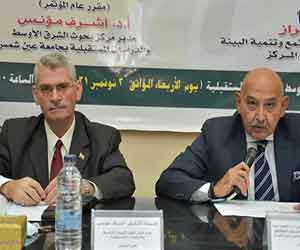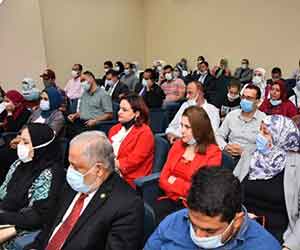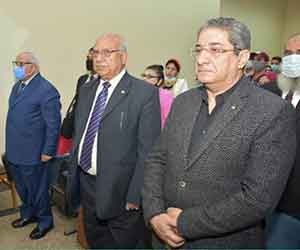Vice President of Ain Shams University for Community Service inaugurates the international conference "Egypt and Sustainable Development in the Nile Basin Countries and Africa"
The activities of the international conference "Egypt and Sustainable Development in the Nile Basin Countries and Africa", held by the Middle East Research and Future Studies Center, were launched within the framework of the cultural season for the academic year 2021-2022, under the auspices of Prof. Dr. Mahmoud El-Metini, President of Ain Shams University, and Prof. Dr. Hesham Tamraz, Vice President for Community Service and Environmental Development, Chairman of the Center's Board of Directors and President of the Conference, Prof. Dr.. Ashraf Munis, Director of the Center and General Rapporteur of the conference, in the presence of Prof. Dr. Hanan Kamel, Vice Dean of the Faculty of Arts, Ain Shams University for Community Service and Environmental Development Affairs, Prof. Dr. Mr. Fleifel, Professor of Modern and Contemporary History, Cairo University, Prof. Dr. Mohamed Abdel Wahab, Head of the Political Studies Division, Faculty of Arts, Ain Shams University, Prof. Dr. Tarek Mansour, a member of the Board of Directors of the Center and former Vice Dean of the Faculty of Arts, Ain Shams University, and Prof. Dr. Saleh Al-Maslout, Professor of Modern and Contemporary History, Faculty of Arabic Language, Zagazig, Al-Azhar University, Prof. Dr. Salama Al-Attar, Head of the Future Studies Division at the Center and Professor of Education Fundamentals, Faculty of Education, Ain Shams University, and Prof. Dr. Atlal Salem Hanna, Assistant Professor of History, Faculty of Education, Al-Hamdaniya University, Iraq, Dr. Fayza Khattab, a researcher at the center.
Prof. Dr. Hesham Tamraz, Vice President of the University for Community Service and Environmental Development, Chairman of the Center's Board of Directors and President of the Conference, praised the Center's selection of the conference's axis, which highlights Egypt's keenness to support relations between it and the Nile Basin countries and to strengthen these relations.
He stressed that it is known that sustainable development is development that meets the needs of the present without compromising the ability of future generations to meet their needs, meaning that it is the process by which the needs of the current generation can be met without endangering the needs of future generations, making it always the first world issue. The cause that all societies raced for, to develop plans and projects to advance the economic and social environment, and raise the standard of living for individuals and countries.
 |
 |
 |
||
Prof. Dr. Hesham Tamraz pointed to the possibility of achieving these goals through:
• Poverty eradication.
• Improving health and education.
• Achieving economic growth by creating decent job opportunities.
• Providing clean energy, water and infrastructure.
• Attention to human energy through better education.
• Opening a field for scientific and cultural exchange through experts and missions.
• Protection of the natural environment and biodiversity.
• Addressing climate change in an atmosphere of peace and justice.
Therefore, Egypt can contribute and assist in this role and achieve the Egyptian national security and the regional security of the Nile Basin countries, as well as laying the foundations for the sustainable development of these countries.
Based on these factors, the Middle East Research Center was keen to hold this important scientific conference and to come up with recommendations that would benefit the official authorities and decision-makers in the Nile Basin countries and Africa.
Prof. Dr. Ashraf Monis supervised the importance of the conference on several levels, including: clarifying Egypt's role in achieving sustainable development for the Nile Basin countries and Africa, and Egypt's keenness to build bridges of cooperation between it and the Nile Basin countries because of what it constitutes of strategic depth for Egypt, and what the Nile represents in the lives of Egyptians and the peoples of the basin countries. The conference aims to present innovative ideas and select best practices and mechanisms in the management of the Nile Basin.
His Excellency pointed out that the conference also aims to enhance comprehensive cross-border cooperation to alleviate poverty, achieve sustainable development goals, and link policies and practices to serve more than 500 million people in eleven countries living on the banks of the Nile, in addition to highlighting the importance of the conference. Benefiting from water recycling technology for reuse and achieving economic integration between Egypt and the Nile Basin countries through joint projects, hoping that the conference will come up with important recommendations to remove obstacles to development and integration among the Nile Basin countries.
Prof. Dr. Ashraf Monis added that the Egyptian foreign policy attaches great importance to the continent of Africa on many levels, in implementation of an ambitious strategy that addresses the mistakes of the past and builds bridges of cooperation between Cairo and the countries of the continent in general and the Nile Basin countries in particular, hence Egypt's keenness to provide technical expertise in all fields to the brothers in The Nile Basin countries, providing aid and giving priority in all fields (political, economic, social, cultural and educational) and eliminating the gap between Egypt and its brothers in the Nile Basin countries, stressing that Egypt’s strength and national security stems from Africa, and Africa’s strength and progress stems from Egypt, both of which complement each other. And one does not dispense with the other.


.svg)




